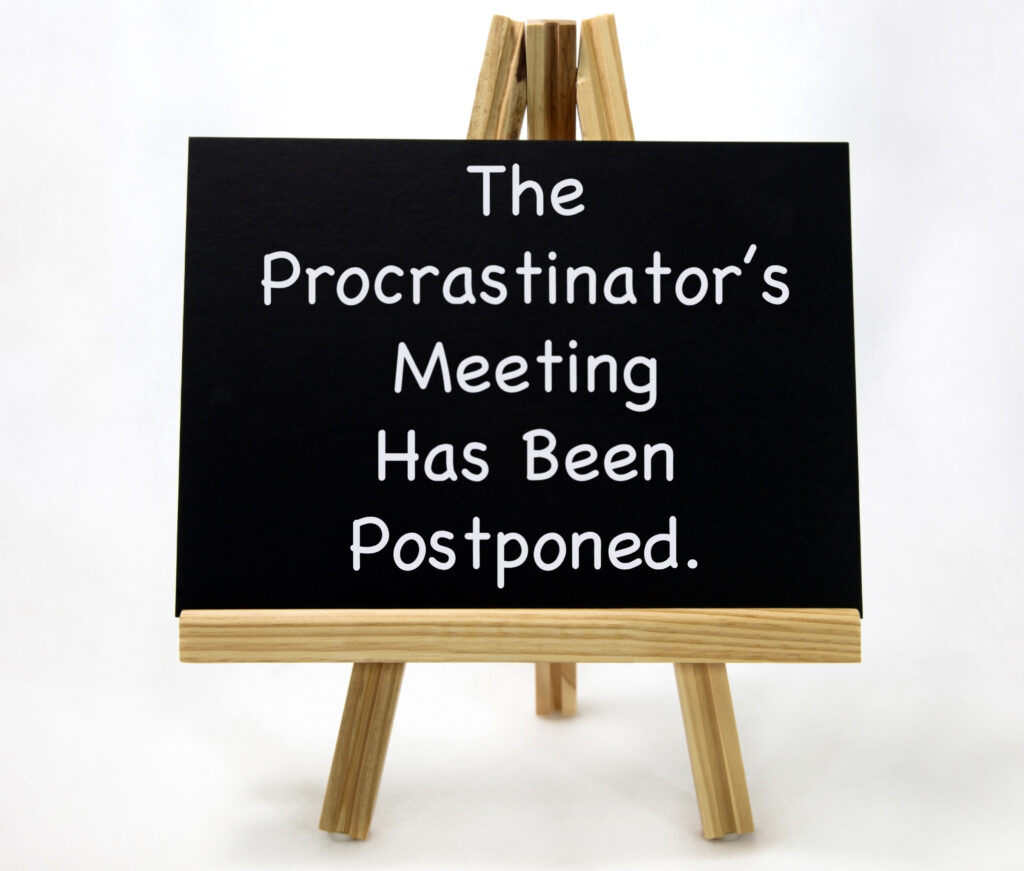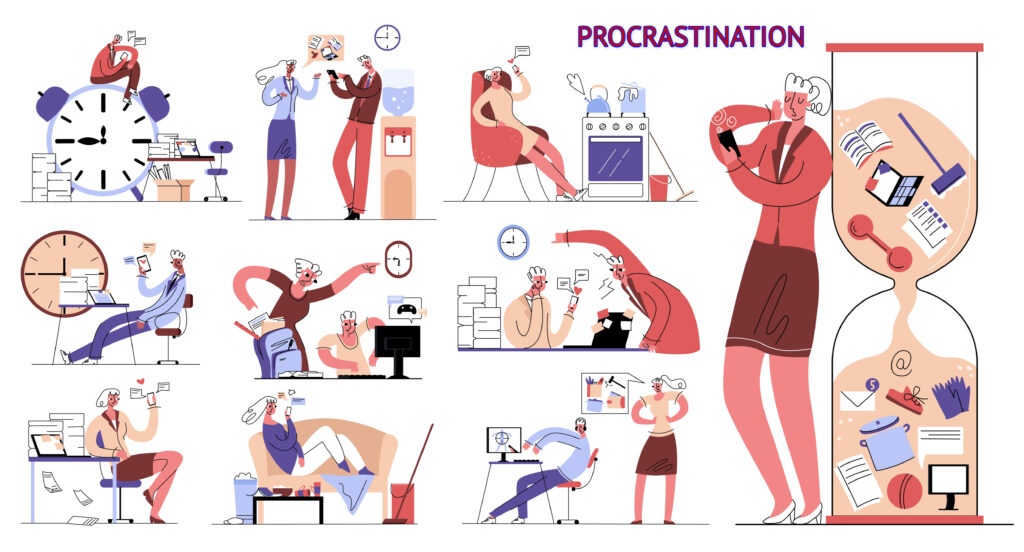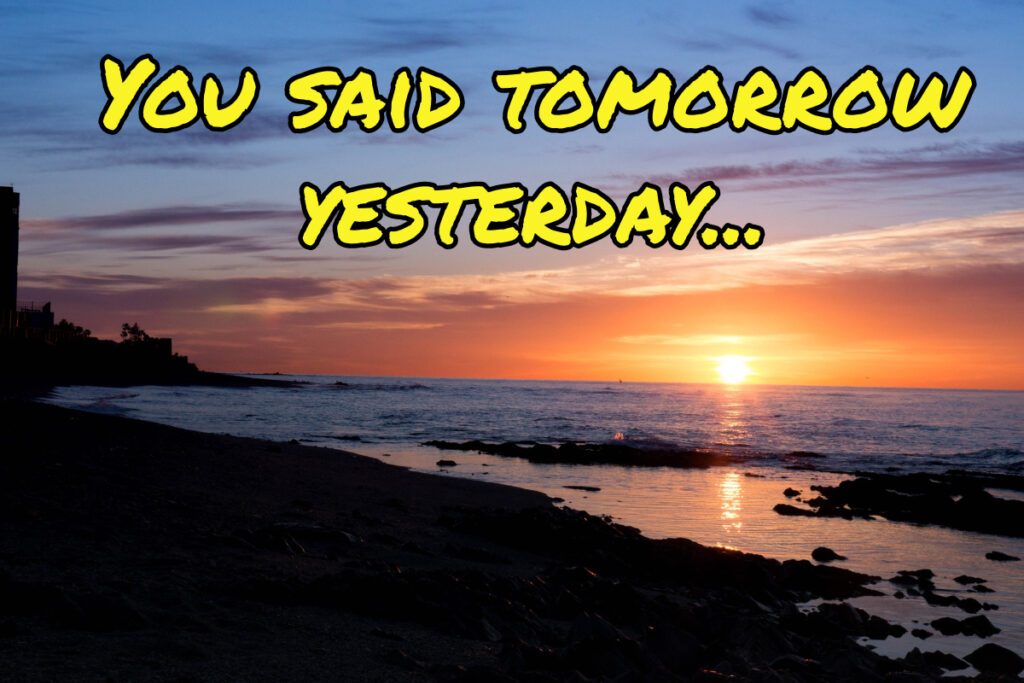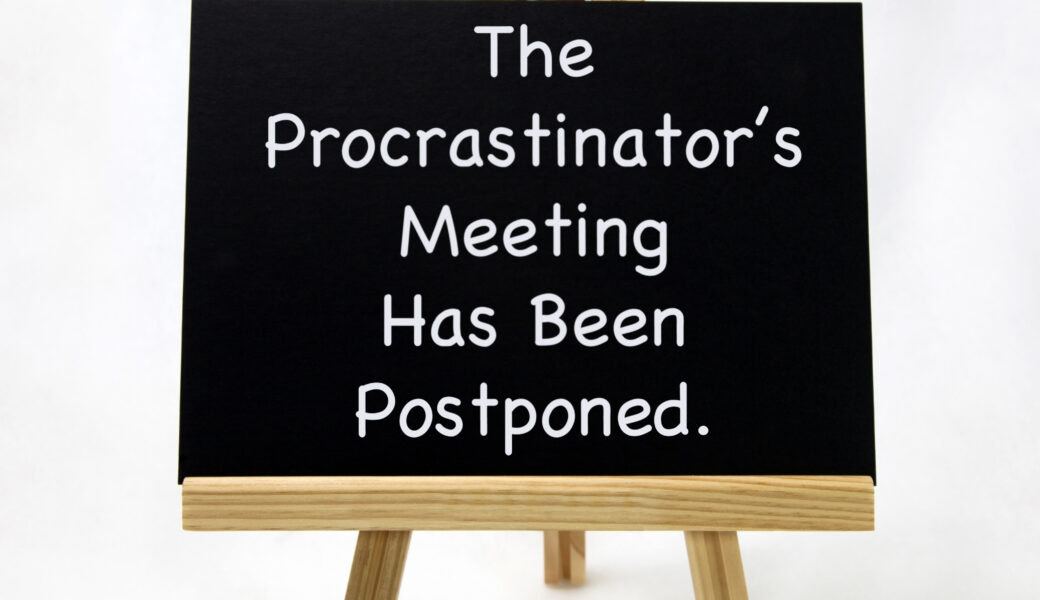
1. Introduction
Procrastination is real, and we all have indulged in it at some time or other.

Procrastination has been around for a very long time. Aristotle used the word “akrasia,” meaning “weakness of will,” for acting against one’s better judgment. Procrastination is behaving against one’s better judgment.
Procrastination is often a self-sabotage strategy that usually hurts the individual who indulges in it. The behavior is thought to be a form of self-regulation failure that often prefers short-term mood fix or immediate gratification over long-term goals or delayed gratification.

Some of us are chronic procrastinators, which can be detrimental to our life, relationships, and finances. We have all heard the words, “Just do it.” Professor Joseph Ferrari says, “To tell the chronic procrastinator to just do it would be like saying to a clinically depressed person, cheer up.”
However, the good news is we have a solution for your chronic procrastination—to think about the consequences of procrastination. Here are thoughts from three great minds about those consequences:
Pablo Picasso said, “Only put off until tomorrow what you are willing to die having left undone.”
Charles Dickens said, “My advice is to never do tomorrow what you can do today. Procrastination is the thief of time.”
Alyce P. Cornyn-Selby said, “Procrastination is, hands down, our favorite form of self-sabotage.”

Now, let us together explore the various aspects of procrastination.
2. Definition of Procrastination
The dictionary definition of procrastination is “the action of delaying or postponing something.”

3. Significance of Procrastination
According to Professor Joseph Ferrari, “Everyone procrastinates, but not everyone is a procrastinator.” Further, his research states that 20 percent of men and women in the US are chronic procrastinators. The current (2021) US population is estimated to be 332,915,073; that translates to 66,400,000 chronic procrastinators.
4. Types of Procrastinators
a. Thrill seekers
These are last minute thrill and excitement seekers. They get their thrills by waiting until the last minute before the deadline to do the task or project. These individuals initially feel they have a lot of time to complete a project before a deadline, and they often end up having very little time to finish the project.
b. Slow decision makers
These individuals have difficulty choosing between different options and waste time, thus losing opportunities. Generally speaking, the more options you are presented with, the more difficult it becomes to make a choice. Further, the more alike the options are to each other, the more difficult becomes the choice-making process. These people procrastinate because they cannot make fast decisions.

c. Those who fear failure
These individuals fear potential failure, and hence, avoid doing the task, and go into the immediate easy way out namely, procrastination.
d. List creators
These individuals keep making detailed to-do lists, but they often do not execute them. The list keeps growing over time and the list overwhelms them.
e. Those susceptible to distractions
These individuals dwell on modern-day distractions and waste their time.
f. Sleepers
These individuals take long naps during the day instead of working and getting tasks completed. They do this especially when at home, during the weekends.

g. Fun lovers
These people have an affinity for low priority tasks. This results in putting off the high-priority tasks, which leads to procrastination.
5. The Root Cause of Procrastination
It is important to understand that procrastination is not due to laziness or difficulty with time-management; instead, it is an emotional problem. According to Associate Professor Tim Pychyl, “Procrastination is not a time-management problem, it’s an emotion-management problem.”
Therefore, we need to analyze our emotions. Why are we putting off doing tasks when we are fully aware, they will become more difficult with each passing day of inaction on our part?
As Abraham Lincoln said, “You cannot escape the responsibility of tomorrow by evading it today.”
6. Why Do We Procrastinate?
a. Immediate gratification over delayed gratification
This reason translates into doing pleasurable activities at the present time and avoiding less pleasurable or more difficult activities or tasks for a later time. You may watch television, instead of cleaning the kitchen, or watch internet videos instead of throwing the garbage bag into the garbage container.
b. Stress, anxiety, and worry
These can lead you to procrastinate. Stress can cause an amygdala hijack, as described by psychologist Daniel Goleman. This leads to an emotional takeover, and in this state, one may gravitate toward procrastination.

c. Distractions
These are often a common pathway to procrastination. It is easy to watch online videos and television, surf the internet, check emails, listen to voicemails, read texts, and more. These distractions easily detach you from the task at hand that you are supposed to finish; instead, you waste valuable time.
d. Perfectionism
A subset of individuals wants to do all tasks perfectly, so they end up not completing most tasks. They often go into analysis paralysis mode.
e. Lack of skillset
When an individual does not have the required skillset to complete a job, they can stall and start procrastinating.
f. Resent authority
Some people resist authority. If they are asked to do a certain job, since they don’t like the authority figure, they delay and complete the job much later than it is supposed to be done.
g. Fear of success and fear of failure
People who have these traits can end up delaying the activity for the next day or even several days or more. They feel if they succeed, they will have significant responsibilities, and they don’t wish to take on those added responsibilities. Similarly, the fear of failure also attracts them toward procrastination.
h. Being a “Yes” person
Yes, people say “yes” to all, and over-fill their plates with numerous pending tasks and activities. Soon they end up not having time to complete the tasks at hand.
i. Altered emotional state
A depressed person can often end up procrastinating. Depression comes in the way of productivity.
j. Nature of the task
If the task is too boring, or if it is too difficult, it can also trigger procrastination.
k. Wrong value to task
Tasks by themselves has no value and no life, so to speak. When we think a task is difficult, we assign a negative value to it and we put off doing it. On the other hand, tasks we think are easy we give a positive value to and complete.
l. Delaying action
The person wants to wait to ensure they have all the resources before taking any actions.
m. Focus deficiency
An inability to focus on the job can lead to procrastination.
n. Daydreaming
Drifting aimlessly often leads to not working on your task.
o. Feeling overwhelmed
Sometimes, tasks to do with limited time, relationships that are demanding, financial obligations, and other demands on your time and efforts can overwhelm you. When you feel overwhelmed, you can temporarily shut down or deflect to more fun-oriented tasks and procrastinate. When you feel overwhelmed, remember it is your thoughts that are misaligned and not your life. Additionally, your problems are usually not as bad as you imagine them to be.
p. Lack of energy and motivation
Lack of energy may be a byproduct of stress, boredom, not exercising your body, and overexertion with inadequate sleep. This energy deprivation can erode your motivation to do tasks, so you may procrastinate.

q. Fear of negative feedback from others
This feeling can block us from action and execution. Irrational and persistent fear of failure is called atychiphobia. Inaction leads to non-productivity and procrastination.
r. Ill-defined or vague goals
When your goals are not clear, you often lack the required steps to reach those goals.
s. Certain disorders can be associated with procrastination
These include:
- Obsessive compulsive disorder (OCD)
- Attention deficit hyperactivity disorder (ADHD)
t. Rewards that are too distant
These individuals are not interested in delayed gratification. Hence, they indulge in immediate gratification and procrastination.
u. Working under pressure
Some believe they work better under pressure, so they often waste their time until the last minute to complete the task. This premise underscores that stress is best for you. Is stress really good for you? The answer is obvious.
v. Mood problem
Not feeling in the mood to do a task may often be an excuse to dwell in distractions.
w. Right time
Some say they are waiting for the right moment to arrive to start their task or project.
7. Effects of Procrastination
a. Loss of job opportunities
Procrastination wastes time. Hence, you have less time to search for job opportunities, and often, you end up losing good job opportunities.
b. People find you to be undependable
Since you give your word to finish a project or complete a certain task and you end up breaking your promises, you soon lose credibility, and others often label you as less or non-dependable.
c. Financial loss
Financial dealings often require timely actions. When you put off paying bills until tomorrow and repeat this behavior, you often end up paying fines and negatively impact your credit rating
d. Not reaching your full potential
Under the umbrella of procrastination are self-sabotage strategies that prevent you from reaching your full potential. When you waste time, and finally when you start doing your task, you now have less time, and hence, you cannot usually perform at your full potential.
e. Time wastage
Procrastination is time wastage. It is doing unimportant or pleasure-seeking activities over priority items that you need to complete.
f. Escalating stress
The more you procrastinate and lose time, the greater the stress will be as the undone projects soon pile up and overflow from your plate.
8. Anti-Procrastination Techniques
a. Have clearly defined goals and steps to achieve them. Use the well-established, “www-h” approach, namely, what, when, why, and how. Another approach is setting SMART goals, namely, Specific, Measurable, Achievable, Realistic, and Timely.

b. Minimize distractions in your work environment and elsewhere.
c. Break the task into smaller segments and tackle each of the smaller segments one at a time until it is all completed. The competition between the neo-cortex and amygdala is dependent on the size and magnitude of the task. If the task is small, then, the neo-cortex can handle it without any interference from the amygdala in the paleo-cortex. If the task is large, then there can be an amygdala hijack. This simply means the amygdala takes over, emotions set in, and your logical thinking neo-cortex is shut down. You cannot think clearly, and you may get overwhelmed; this is a perfect setting to procrastinate and do some easy, fun to do task or stuff your face from the refrigerator.
d. Change the value of tasks. Tasks have zero value, and they are lifeless. We assign value and bring the task to life so to speak. If we think it is a difficult task, we give it a negative value. On the other hand, if we think the task is easy, we give it a positive value. Negative value tasks often lead to procrastination. Hence, change the value of the task from negative to zero value or positive value.
e. Create your own deadline. If the project has a deadline, then you add sub-deadlines, which are before the real deadline.

f. Shift focus. Where you focus, your energy flows. Shift your focus from present to future, meaning visualize the task completed and you celebrating with your friends and relatives. This creates new energy and motivation to get started on the job and bring it to a completion.
9. Conclusion
Procrastination has many faces, facets, and features. If you don’t watch out, you may get sucked into this quicksand of success killer, dream buster, and financial loss.

Your enemy is procrastination. Study the various techniques mentioned in this blog to overcome procrastination. Finally, tell yourself, you are here to “bury procrastination once and for all, and not to praise it!”
References
- https://www.lexico.com/en/definition/procrastination
- https://pubmed.ncbi.nlm.nih.gov/30638308/
- https://www.psychologytoday.com/us/blog/the-adaptive-mind/201901/how-overcome-procrastination-starting-now
- https://www.populationpyramid.net/united-states-of-america/2021/
- https://www.eminentconsulting.net/blogs/procrastination-is-an-emotional-problem/
- https://www.healthgrades.com/right-care/symptoms-and-conditions/lack-of-energy#:~:text=Lack%20of%20energy%20can%20be%20described%20as%20tiredness%2C,overexertion%2C%20overworking%2C%20stress%2C%20lack%20of%20exercise%2C%20or%20boredom.
- https://www.atlassian.com/blog/productivity/how-to-write-smart-goals
Disclaimer
All blog posts and content on this website are for general information purposes only. We are not responsible for how you choose to use this information. It is always best to consult your physician before making any major life changes that may affect your physical health or mental wellbeing.
Author
DrTJ (Thomas John, MD, DTM) is the author of Your Lifeonomics: Take Action Now to Immediately Improve Your Life.
Visit him at speakerdrtj.com. Email: drtj@speakerdrtj.com. Click here to order your copy of the book: Your Lifeonomcs

DrTJ / Thomas John, MD, DTM
“DrTJ” / Thomas John, MD, DTM, is an international best-selling medical author, professional keynote speaker, personal coach, motivational speaker, and corporate leadership and sales trainer.
He has delivered numerous medical speeches as an invited speaker and keynote speaker both in the United States and worldwide. He has been featured globally on TV and has appeared on The Doctors Show.
Internationally, he has been invited to speak in Canada, Italy, India, South Africa, Serbia, Argentina, Greece, Brazil, Mexico, Peru, and Finland. He is listed in Chicago’s Top Doctors, America’s Top Doctors, and America’s Top Ophthalmologists. He has been featured in leading newspapers and magazines in the United States and abroad.
Dr. TJ is also a rock ’n’ roll drummer, dancer (ballroom, line, disco), and writer.
If you want a powerful, inspiring motivational and professional keynote speaker who will leave your audience members with an impactful experience they will never forget, book DrTJ today!
If you want to transform your life for the better, look no further. Make DrTJ your personal life coach!

Order copy of this life changing book today!Click here

DrTJ, MD, DTM
Order copy of this life changing book today!Click here
Latest posts by DrTJ (see all)
- Emotional Intelligence: The Secret to Building Strong Relationships and Achieving Success - April 17, 2023
- Procrastination – Definition, Perspective, and Overcoming It - February 15, 2021
- Breaking Point, Boiling Point, and Beyond - February 5, 2021

Great advice. I find that setting deadlines for myself and just doing one small thing at a time over a span of time helps me overcome procrastination. I also find I feel overwhelmed at time but the best way to solve that is to start chipping away at what needs to be done. Thank you for the reminders of what I need to do.